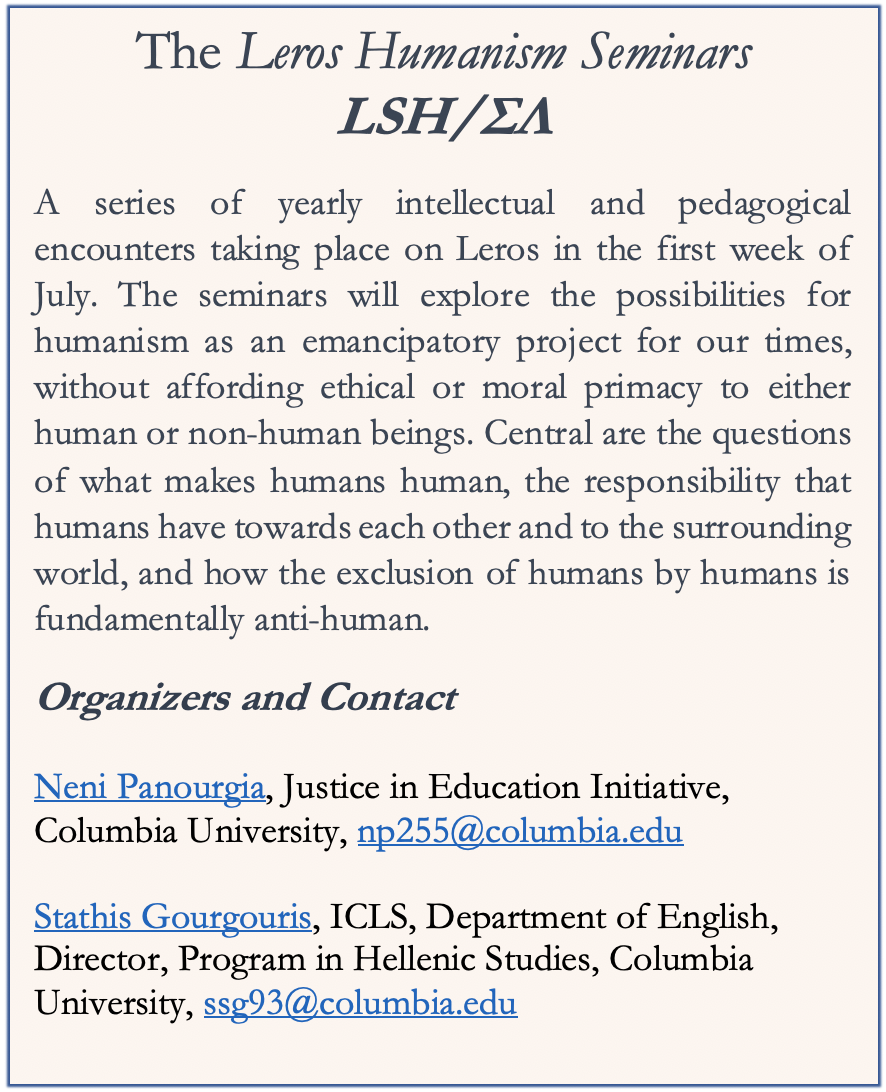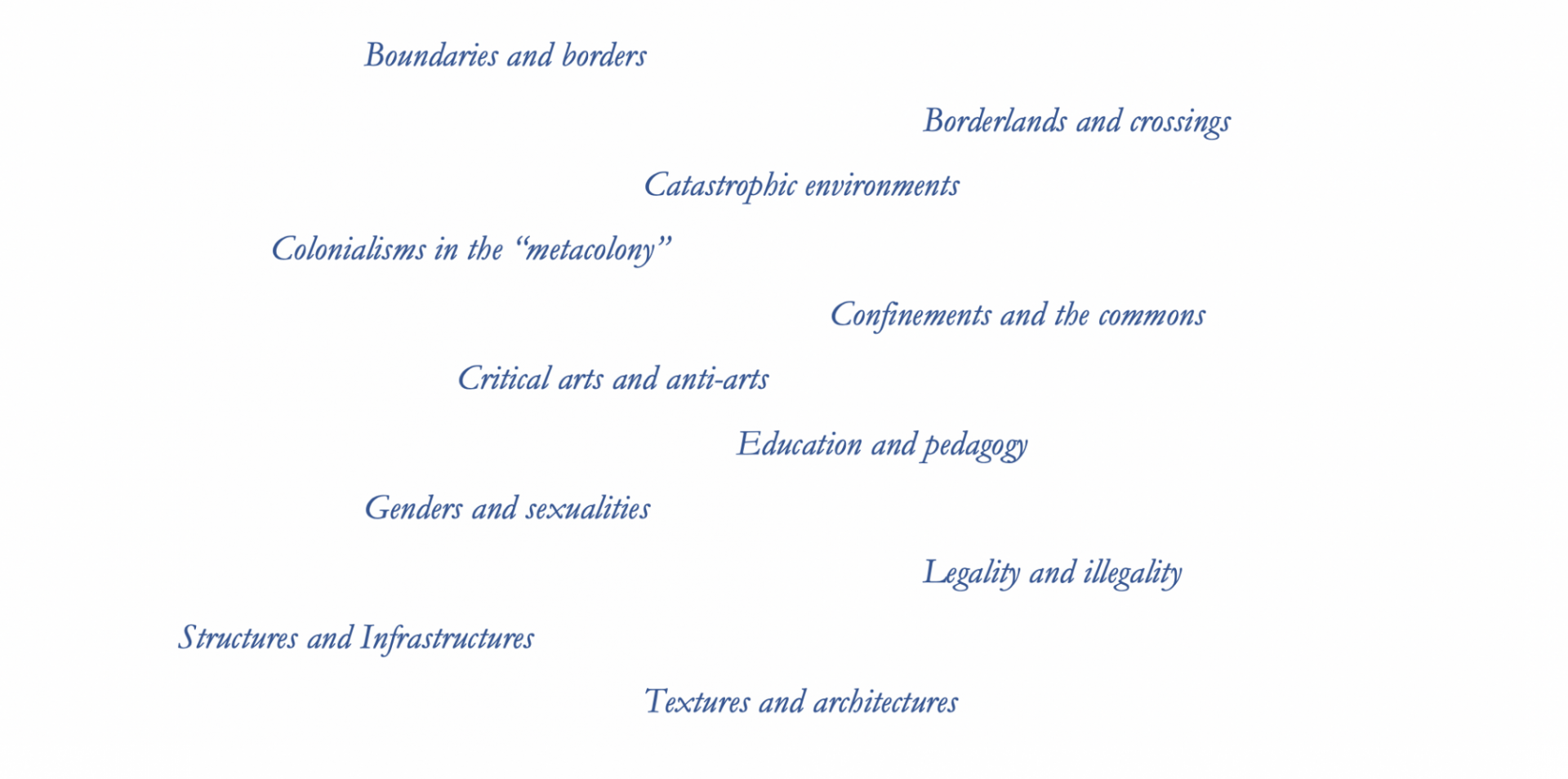July 3-6, 2023 | Leros, Greece


Organizers and Contact
Neni Panourgia, Justice in Education Initiative, Columbia University, [email protected]
Stathis Gourgouris, ICLS, Department of English, Director, Program in Hellenic Studies, Columbia University, [email protected]
The 2023 Seminars are presented by
Columbia University:
The Institute for the Study of Religion, Culture, and Public Life with the Program in Hellenic Studies, Justice Forum (Justice-in-Education Initiative, Society of Fellows and the Heyman Center for the Humanities), and the Columbia Center for Contemporary Critical Thought (Columbia Law School).
with support from
Florida Atlantic University, The General State Archives, Local Historical Archive of Leros , Panteion University, University of California, Los Angeles, University of Thessaly, and the Cultural and Educational Association “Artemis” of Leros
Project Description
The Leros Humanism Seminars/LSH/ΣΛ are a series of yearly intellectual encounters to take place on the island of Leros in the first week of July. Starting with the inaugural event in the week of July 3rd, 2023, the seminars seek to bring together scholars, artists, and activists along with college students and post-graduates (from Greece and abroad), as well as interested local population, in order to (re)consider collectively the multifarious premises of the human as individual and as social living-being while engaging different discourses and practices of conflict, communication, and coexistence.
We are putting this Seminar Series on Leros together as a minimum tribute to this magical island that has given to so many of us so many reasons for stochastic reflection, has pushed our limits of comfortable thought, and has challenged the conceptual certainties of what is a place, what is space, what is existence, what is the human being, what is confinement, what is order and what disorder, who is familiar and who is a stranger, what are the amplitudes and the limits of belonging, just to name a few. And it has done so in perfect dissonance with its physical environment which is nothing short of sublime.
The broad object of the seminars is to field anew the question of “what is human” and how “what is human” is determined in numerous registers of history and life by reconceptualizing humanism away and against its established and unexamined presumptions. Topics and domains of inquiry, to be explored presently and in the coming years, include:

Standing in the midst of these domains, the seminars will seek to problematize, interrogate, affirm, and posit anew specific questions that look backwards in history and forward in the present-future that test the capacity of humanist practices: How does the humanism of the anti-colonial era address the dehumanization of populations in the present? Can human beings assimilate technologies in an ontological sense, as posthumanists claim? Can we think about the human as living-being determined by politics, beyond the Aristotelian political animal? How can human-being as an ontological condition continue to stand in the context of anthropological (racial, sexual, cultural) difference? Can we think about the human as the non-ontological cornerstone of the social? Can we, or should we, revisit “species-being?” In the following years each one of these topics will be the framework of each year’s seminar.
The seminars will be conducted in a two-fold structure:
- During the first two days of the seminar cycle we will hold three roundtables each day. Each roundtable will be an interaction among participants from different disciplines, actions, and registers. There will be no concurrent sessions. There will be a 3-hour break in the middle of each day for personal leisure and exploration, taking advantage of the beauty of this unique island. We imagine that the intellectual encounters of the conference will very well continue off stage in these settings.
- The third day the seminars will shift into a day-long workshop for graduate students and faculty run by volunteers from the seminars on topics proposed by the workshop faculty. The purpose of these intensive sessions will be explicitly pedagogical and student-focused beyond the typical parameters of the Anglo-American academy.
Participants 2023
Columbia University
Ivan Calaff, Justice in Education Initiative
Eileen Gillooly, Justice in Education Initiative
Bernard Harcourt, Columbia Center for Contemporary Critical Thought
Marissa Gutierrez-Vicario, Columbia Center for Contemporary Critical Thought
Mia Ruyter, Justice in Education Initiative
Fonda Shen, Columbia Center for Contemporary Critical Thought
Nadia Urbinati, Political Science
Cooper Union
Kevin Bone, School of Architecture
FAU- Florida Atlantic University
Adriana Garriga-Lopez, Anthropology
Panteion University
Athena Athanasiou, Anthropology
Penelope Petsini, Political Science and History
Rhode Island School of Design (RISDI)
Katerina Stefatos, History, Philosophy, and the Social Sciences
Dimitris Papadopoulos, Teaching and Learning Lab
University of California, Los Angeles (UCLA)
Aamir Mufti, Comparative Literature
Saloni Mathur, Art History
University of Thessaly (UTH)
Phoebe Giannisi, Architecture
Zissis Kotionis, Architecture
Ioanna Laliotou, IAKA/History
Elena Tzelepi, IAKA, Anthropology
Non-University-based scholars and artists
Eugenia Bone, Food and Science Writer
Theodoros Megaloeconomou, Psychiatrist
Nikos Panayiotopoulos, Photographer
Panagiotis Papadopoulos, Former political prisoner
Georgia Sarigiannidou, Former political prisoner
Graduate Students
Chloé Howe Haralambous, Social Sciences Research Council
Suleiman Hodali, Comparative Literature, UCLA
Jake Lasky, Florida Atlantic University
André Luke Pettman, Department of French, Columbia University
Haider Shahbaz, Comparative Literature, UCLA
Jamel West, Florida Atlantic University
